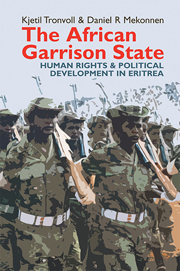Book contents
- Frontmatter
- Contents
- List of Acronyms and Abbreviations
- Preface
- Map 1 Provinces, Main Towns and Ethno-linguistic Groups of Eritrea
- 1 Introduction: The Eritrean Garrison State
- 2 Judicial Development in Independent Eritrea: Legal Pluralism and Political Containment
- 3 Rule of Law(lessness): The Special Court and the Judiciary
- 4 Democratic Curtailment: ‘Never Democracy, Always Control!’
- 5 Obliterating Civil Society: Denying Freedom of Organisation and Expression
- 6 The Eritrean Gulag Archipelago: Prison Conditions, Torture and Extrajudicial Killings
- 7 Everyday Life of Detention and Disappearances: Vulnerable Groups in a Population Under Siege
- 8 Minority Marginalisation: EPLF's Policies of ‘Cultural Superiority’
- 9 Diversity Diminished: Targeting the Kunama Minority Group
- 10 The Militarisation of Eritrean Society: Omnipresent and Never-Ending Military Service
- 11 Eritrea: Towards a Transition?
- Bibliography
- Index
4 - Democratic Curtailment: ‘Never Democracy, Always Control!’
Published online by Cambridge University Press: 05 October 2014
- Frontmatter
- Contents
- List of Acronyms and Abbreviations
- Preface
- Map 1 Provinces, Main Towns and Ethno-linguistic Groups of Eritrea
- 1 Introduction: The Eritrean Garrison State
- 2 Judicial Development in Independent Eritrea: Legal Pluralism and Political Containment
- 3 Rule of Law(lessness): The Special Court and the Judiciary
- 4 Democratic Curtailment: ‘Never Democracy, Always Control!’
- 5 Obliterating Civil Society: Denying Freedom of Organisation and Expression
- 6 The Eritrean Gulag Archipelago: Prison Conditions, Torture and Extrajudicial Killings
- 7 Everyday Life of Detention and Disappearances: Vulnerable Groups in a Population Under Siege
- 8 Minority Marginalisation: EPLF's Policies of ‘Cultural Superiority’
- 9 Diversity Diminished: Targeting the Kunama Minority Group
- 10 The Militarisation of Eritrean Society: Omnipresent and Never-Ending Military Service
- 11 Eritrea: Towards a Transition?
- Bibliography
- Index
Summary
Just as the People's Front [EPLF] had a clear vision during the liberation struggle that enabled it to realize the dream of establishing a free and peaceful Eritrea, likewise in the new post-independence period it had a clear vision for the future development of Eritrea. This vision aims at establishing a country where justice, democracy and prosperity prevail.
Eritrean Government, Ministry of Information, 19 April 2005What kind of country is that which everyday throws its sons and daughters to the furnaces of war? Whoever is spared from that is thrown in jail because they pronounced truth and demanded justice. Whoever escapes that fate is stranded in the diaspora, always suffering the distance, missing his country and living in hope of returning.
Mohammed Nur Ahmed, former Eritrean Ambassador to China, Extracts from a letter sent to the Eritrean Ministry of Foreign AffairsINTRODUCTION
Eritrea today is a country under siege by its own government, the Eritrean People's Liberation Front (EPLF). The pretext of external enemies is used as an excuse to deny people their basic rights and freedoms of opinion and expression, to organise and assemble, and to practise their religious beliefs (Connell 2007; AI 2008b; RWB 2008; USSD 2008a, 2008b; HRW 2009; USSD 2009). The Eritrean government does not allow any alternative voice or opinion to be heard; all resources and people are mobilised and channelled into maintaining the country's totalitarian and militaristic structure.
- Type
- Chapter
- Information
- The African Garrison StateHuman Rights and Political Development in Eritrea, pp. 56 - 74Publisher: Boydell & BrewerPrint publication year: 2014



